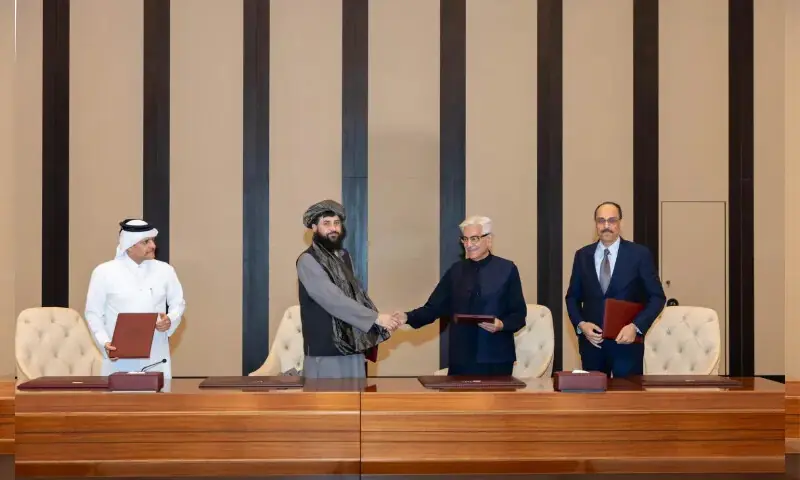After a week of deadly cross-border clashes that left dozens dead and hundreds wounded, Pakistan and Afghanistan have reached an immediate ceasefire following high-level talks in Doha, mediated by Qatar and Turkiye. Both governments vowed to halt hostilities, respect sovereignty, and establish mechanisms for “lasting peace and stability” across their shared border.
The Qatari Ministry of Foreign Affairs confirmed the breakthrough, noting that the two sides will meet again soon to consolidate the truce. Pakistan’s Defence Minister Khawaja Asif announced that both countries have agreed to respect territorial integrity and end cross-border terrorism “emanating from Afghan soil.” The next round of follow-up talks is scheduled for October 25 in Istanbul, to create a verifiable system for ceasefire monitoring.
Follow Republic Policy on YouTube
Pakistan’s Deputy Prime Minister Ishaq Dar described the ceasefire as “the first step in the right direction,” expressing hope that it will lead to a permanent framework to curb militancy. On the Afghan side, Zabihullah Mujahid, spokesperson for the Taliban government, said both countries had reaffirmed commitments to peace, mutual respect, and the principle of non-aggression. He added that neither side will target each other’s security forces or infrastructure, nor support groups engaged in cross-border violence.
The border violence began on October 11, following reports of Pakistani strikes in Kabul and Paktika, aimed at groups allegedly linked to attacks inside Pakistan. Since then, tensions have escalated sharply, marking the lowest point in bilateral relations since the Taliban’s return to power in 2021.
Follow Republic Policy on Facebook
Pakistan accuses the Afghan Taliban of providing safe haven to Tehrik-e-Taliban Pakistan (TTP) and other armed groups operating in Khyber Pakhtunkhwa and Balochistan. These areas have suffered heavily from cross-border attacks in recent months. According to the Center for Research and Security Studies (CRSS), Pakistan has witnessed over 2,400 deaths in the first nine months of 2025 — a 46% increase from last year.
Follow Republic Policy on TikTok
The TTP, though ideologically aligned with the Afghan Taliban, operates independently and has conducted hundreds of attacks inside Pakistan in recent years. The group’s resurgence since 2021 has strained relations between Islamabad and Kabul, reversing decades of cooperation. Pakistan insists that the Taliban prevent any militant activity from Afghan territory, a demand Kabul says it already upholds under its policy of not allowing Afghan soil to be used against other nations.
Follow Republic Policy on Instagram
Analysts warn that both sides must address underlying mistrust. Abdullah Baheer, a political scholar in Kabul, told Republic Policy that “there are no winners in war — only losers.” He criticized recent strikes inside Afghanistan, arguing that such measures only deepen resentment and fail to dismantle cross-border networks. “If two decades of bombing didn’t work for the United States, why would it work now?” he asked.
Follow Republic Policy on WhatsApp Channel
The Doha ceasefire marks a rare moment of diplomacy between Islamabad and Kabul, offering a narrow window for reconciliation. But lasting peace will depend on whether both countries can transform temporary restraint into a permanent political understanding — one that acknowledges their shared geography, intertwined security, and the need for mutual trust over force.
















